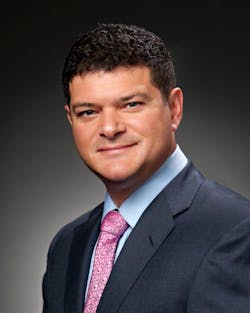Although defense lawyers are concerned about how electronic logging devices could negatively affect carriers, a plaintiffs' lawyer suggests that ELDs could actually halt some unwarranted lawsuits in their early stages, lessen the jury-confusing banter of expert witnesses and protect carriers and drivers who are safety conscious.
By checking data from ELDs, plaintiffs' attorneys may know more quickly if a lawsuit has merit, according to Joseph Fried, trial attorney at Atlanta-based Fried Rogers Goldberg LLC. In most cases, a lawyer will first file for discovery from a carrier to decide if a lawsuit is worthy of additional time and effort. ELDs could shorten that discovery time period and perhaps indicate sooner that a lawsuit is not worth pursuing.
"There have been many cases that I would have filed in order to do the discovery but I chose not to file because I looked at the information on the front-end, and it didn't support my case,” Fried said. “I’ve done my investigation, and I can go back to the grieving family who I’ve typically promised, 'I’m going to get to the truth. I’m going to be able to give you an answer, or at least I’m going to try,' and if I have that [ELD] information, I can go back to them [more quickly]. That does not mean they may not go find somebody else to file the lawsuit."
Fried not only teaches plaintiff's lawyers but also has appeared at conferences for defense attorney's, too. "I teach lawyers all over the country, specifically about trucking litigation, and I tell them that you want to be the kind of lawyer who has credibility [so you can ask for ELD data upfront]. If you’re going live a life of credibility, that means not bringing bullshit lawsuits, and if you approach somebody [a carrier's lawyer] and you ask for something and they say 'no,' then you probably have a pretty good lawsuit. Go file it. In my experience, if they have supporting material that helps them, they’re very happy to show it to me on the front end. To that degree, I think [ELDs] can be a litigation stopper."
Fried also believes that ELD data can put a damper on the 'he-said, she-said' battle of expert witnesses and hiring of special auditors because the data often can speak for itself. He notes that ELD providers want to provide the most accurate, unbiased and trustworthy data to bolster their own trustworthiness in the industry. To accomplish that, they will not "back up the industry at any cost."
"I still think you have to be able to understand the data, and you have to put it into context,” Fried added. “And there’s going to be some plaintiff lawyers who want to take it out of context and try to make it say something that it’s not really saying, and there are going to be some defense lawyers that do the same. But I’ve got another source to go get the information from, namely the ELD provider, and they're most interested in maintaining their reputation for voracity of their ELD product."
He explained that he no longer has to hire experts to try to decipher logs and do costly audits because the ELD company can provide that information. "In the old days… if I had to do my own log audit, I had to rely on a company to provide me with all kinds of stuff - stuff that they’re supposed to be maintaining for compliance anyway - but in litigation somehow, it becomes overly burdensome to produce. Most plaintiff’s lawyers then have to go and hire a $300-an-hour expert to do a log audit. If you’re doing that for a period of a couple of months, that’s a costly proposition. So I do think it [ELDs] will make the data more readily available and more easily understood. I think you still need to correlate it, but less so. It’s an easier log audit, because there’s so much corroborating stuff built into it if it’s really tied into the ECM (engine control module). There’s some gamesmanship that’s still possible with ELDs, but it’s harder."
Fried mentioned that ELDs can also eliminate or cut down on the need for accident reconstruction specialists. "Accident reconstruction becomes simpler, because I can look at data and I can see 5 seconds, 10 seconds, a minute and 45 seconds, depending on the carrier and the ECM, and I can see what really was going on. I can see when the brakes were applied, for example, whereas before each side would hire a reconstructionist, and they would sometimes wave their hands in the air and say, 'This is what happened.' The role of the expert is changing. ELD changes it, because there’s less work for them to do on audits. Proving an hours-of-service case, for instance, is a very different process under ELD."
Fried, who was a police officer in Atlanta before becoming a lawyer, said that highway safety has always been in his blood and that being a lawyer is a continuance of his interest in safety. "What I do now I kind of view as a continuation of my law enforcement career. I just have better resources than I ever had in law enforcement."
“I’m spending about 40% of my professional life doing things I don’t get paid for [like speaking engagements and teaching], so I guess that’s either good or bad, depending on who you ask," he added.
The bottom line for Fried about ELDs is how the mandate can positively affect driver and carrier behavior. "The data is there. Trucking companies that are doing what they’re supposed to be doing in terms of monitoring and supervising their drivers are going to be rewarded. Companies that are not, will have a new reason to change their ways, because they’re going to get bitten by this data and their lack of responsiveness to the data if they’re not."





